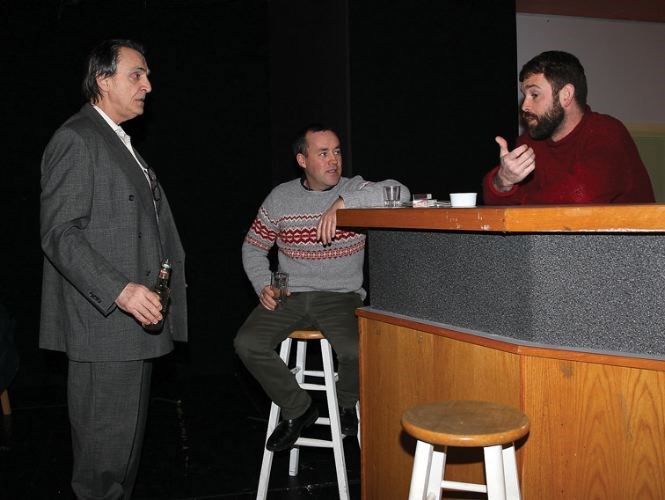The Weir is a story about stories.
It's about the telling of stories and the living of stories. It intermingles the fantastical and impossible stories with the real and raw ones, and how sometimes it's hard to tell the difference even in your own mind. What's really true about a memory? What's a fact versus what's an impression?
It's about how, when folks get together in just the right kind of place, in just the right kind of conditions, the stories spill out.
They pour like Guinness cascading into a pint glass, or like floodwaters over the walls of a dam.
If the Irish are known for any two things, it's drinking and stories, which are themselves just cultural metaphors.
Going inside playwright Conor McPherson's play The Weir is as easy as stepping inside CNC's little Stan Shafer Theatre (Room 1-306) and pulling up a chair at the little pub created inside. It has all the adornments of an actual Irish pub (the staff of Nancy O's actually helped dress the set) and that includes all the characters who'd come through the door if this really were somewhere between Benbulben Mountain and Lough MacNean.
There's the barkeep, of course, played by rookie actor David Underwood who got his community theatre career off with a good, careful pour. He's an Irishman playing an Irishman, so that wasn't a huge stretch, but that doesn't make for acting chops and Underwood set himself apart with his deft performance as understated pub owner Brendan.
He wasn't there when his main customer Jack came into view in the opening scene, which gave Jack's actor Pierre Ducharme the chance to show his skills before anyone had even uttered a word.
Jack walks in and finds the place deserted so he sets about pouring himself a glass of the dark stuff.
It was subtle, but it was an acting clinic, convincing the audience without a word that he had been there so many times on such good terms that he could just help himself to a beer and he knew instinctually where everything was.
The Ducharme effect never slows. The play is heavily carried by the Jack character and this veteran actor who is, in all ways but the literal one, a professional talent. He is the strength of all community theatre: a resident among us, just one of the local folks, and yet able to profoundly inhabit a person of fiction and bring words on a page into vivid life. Do yourself the favour of going to see The Weir if only to watch Ducharme so vitally become someone he is not.
He's not at all the only one. If there was a surprise for me in this whole affair it was Catherine Higgins who plays Valerie, the city girl thrust unexpectedly into this den of men from the country. She's a familiar figure on the local stage, but always in musical groups. This was not her first turn at theatre, but it was her first role demanding a range of emotions and what a range. What emotions. She has to render Valerie every night for the duration of The Weir's run, and she must certainly go home exhausted from the effort.
It's a heavyweight role and Higgins hits the ball like Hank Aaron.
I had chills and a mouth hanging stupidly open by the time she was done.
It helped her, no doubt, to be in such capable hands with this cast.
Joining the aforementioned were Frank Caffrey, who is one of the city's most seasoned veterans of the stage and also one of the city's best. Comedy, villainy, he can do it all, and the role of Finbarr was a bit of both. His was easily the most complex character, a man from the rural village who had moved away to big-town success and was now back again to show Valerie around. Caffrey had to walk a lot of emotional lines and never slipped once.
Then there's Jim, the softspoken handyman played by Rory Daly. It helps that Daly is Irish so he has a comfort with the dialogue, but for a first-time community actor he gave a smooth telling of his part of the story.
And by story, I mean stories.
This play is layer upon layer of the men swapping spooky tales, then swapping anecdotes of reaction to them. It shows just how mean men can be with each other, and how tender and diplomatic as well. And when a woman is introduced into the mix, the script shows how those behaviours can change, or stay the same, depending on the cut of the moment.
Ultimately, the story is about the way times change, yet the way shadows of past cultures always seem to sweep through the room.
When you're with your friends, your community, it is easier to take than when you're all alone.
The true heartbeat of life, you see, is not the incident or the impression, it is the telling of it, the passing it on, the processing of it out loud.
As The Weir is processed out loud it is impossible to escape the fact this rural northern town had a dam built there in the 1950s and life changed for the inhabitants. Gee. Where else were dams built in the 1950s that drastically altered the culture of the area? Hmmm. Perhaps that's a thought that could use some sitting and thinking about, by a fire, with friends, at a favourite pub.
This one is available at CNC thanks to Pocket Theatre (co-produced by Cinema CNC) and director Dominic Maguire tonight, and Feb. 1-4.
Tickets are on sale now at Books & Company or at the door.



